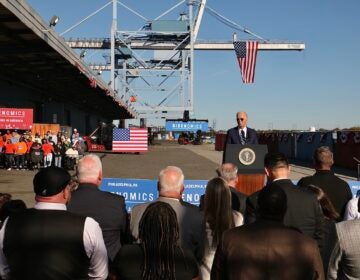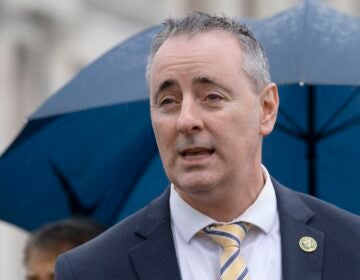U.S. Energy Secretary Rick Perry salutes fusion work at N.J. lab
Perry visits Princeton Plasma Physics Laboratory for a tour and a chance to address hundreds of scientists.

U.S. Secretary of Energy Rick Perry speaks to scientists at Princeton Plasma Physics Laboratory. (Emma Lee/WHYY)
“If we break this code — if we are able to deliver fusion energy to the world, we have changed the world,” said U.S. Department of Energy Secretary Rick Perry in his address to hundreds of scientists at the Princeton Plasma Physics Laboratory Thursday.
Researchers at the lab have been working for years on nuclear fusion — a process that produces energy by tightly squeezing hydrogen atoms together to make helium atoms. But it’s expensive.
After his tour of the facility in Plainsboro, New Jersey, Perry said he welcomes recent commercial interest in fusion technology to make the clean energy source a reality.
“I’m a big supporter of public-private partnerships. I think government has a real role in being a partner and having skin in the game,” he said.
He also pledged to support the lab’s STEM education initiatives in the fields of science, technology, engineering, and mathematics.
“If we get the hooks into these people early on and get them in the pipeline … and then support them after they get their graduate and post-grad degrees, and make sure we can keep them in that pipeline,” he said. “Then the future is ours.”
In 1995, the lab was the first to produce 10 million watts of fusion energy. Now, director Stephen Cowley said PPPL will begin trying to make a smaller, cheaper version of the achievement in 2020.
“We have to heat the fusion fuel to something like 250 million degrees. And then we have to hold it while it reacts. And all the experiments up to now have had a lot of turbulence, bubbling,” said Cowley who became the lab’s seventh director in July. “Because the middle is really hot, and the edge is really cold — and whenever you have a big temperature gradient like that it bubbles. And it’s that bubbling that’s made it really difficult to bring down the scale.”
PPPL — part of the national laboratory system funded by the Department of Energy through the Office of Science — is participating in ITER, an international fusion experiment in southern France.
“The idea there is to prove the experiment creates much more energy than it takes to make the fusion itself,” said Cowley. Unlike fission, where nuclear energy splits a heavy element to create energy, fusion combines two light elements, to make a heavy element. Fusion energy, which emits no greenhouse gasses and low amounts of radioactive waste, uses hydrogen and lithium instead of rare metals.
The problem is that bubbling.
“Our answer is to spin it,” said Cowley, who said he expects fusion power to become a reality in his lifetime.
Princeton, a vestige of the Manhattan Project, is one of 17 national labs run by the Department of Energy. However, that number may soon drop to 16.
“We’re making the decision to shut down the MOX project at Savannah River,” said Perry of the lab that researches environmental remediation in Aiken, South Carolina. “No. 1 because it’s been not managed as well as it should have been managed. And there’s some real clear indications that the technology is antiquated and there’s a more reliable, faster, and cheaper way to deal with the plutonium.”
Perry said he sees great promise, however, in funding fusion technology, although the rewards may still be decades away. He and Cowley agree that the future lies with the next generation of scientists and super-computers.
“It takes an awful long time to get new technology to market,” explained Cowley. “We had solar cells in the early part of the 20th century, and it’s only now that people are using it to produce significant amounts of electricity. So we would like to get fusion to market faster than that.”
Correction: An earlier version of this story incorrectly stated the the Department of Energy’s intentions for the Savannah River laboratory. It is considering shutting down the MOX project, not the whole site.
WHYY is your source for fact-based, in-depth journalism and information. As a nonprofit organization, we rely on financial support from readers like you. Please give today.




